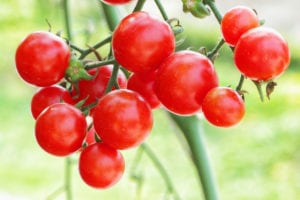Written by Joyce Smith, BS. Results of this study suggest that only carotenoid levels achieved by the tomato nutrient complex dose of 15 mg of lycopene or higher correlate to a beneficial effect on systolic blood pressure in hypertensive subjects while lower doses and lycopene alone do not.
 Previous studies have shown that the pathogenesis of hypertension, a major risk factor for cardiovascular disease, is linked to oxidative and inflammatory processes. The many available pharmaceutical drugs have a high profile of serious side effects, making a strong case for the use of alternative and complimentary treatments for blood pressure (BP) control 1. Among them are lifestyle modifications, particularly dietary changes such as increased fruit and vegetable consumption 2.
Previous studies have shown that the pathogenesis of hypertension, a major risk factor for cardiovascular disease, is linked to oxidative and inflammatory processes. The many available pharmaceutical drugs have a high profile of serious side effects, making a strong case for the use of alternative and complimentary treatments for blood pressure (BP) control 1. Among them are lifestyle modifications, particularly dietary changes such as increased fruit and vegetable consumption 2.
As an antioxidant, lycopene has proven beneficial for vascular and blood pressure health 3, yet as a food supplement it has shown mixed results. A current meta-analysis revealed that lycopene can reduce higher systolic blood pressure (SBP) (above 120 mmHg) but has no effect on diastolic blood pressure (DBP). Tomato extracts contain lycopene, ß-carotene and the colorless carotenoids phytoene and phytofluene as well as tocopherols and polyphenols which may all be cardioprotective. In this study, Wolak et al 4 aimed to compare the effect on blood pressure of pure synthetic lycopene to a proprietary tomato extract. To complement their previous work with pre-hypertensive (HT) patients 5,6 they tested the BP lowering effects of tomato extract in untreated stage 1 and 2 HT patients in an attempt to establish a dose dependency and to show bioavailability of the major carotenoids present in tomato extract.
In the double-blind, randomized, placebo-controlled study , 61 volunteers between the ages of 35 and 60 years of age were divided into 5 treatment arms and given either a tomato nutrient complex (TNC) standardized to 5, 15, or 30 mg lycopene, 15 mg of synthetic lycopene, or placebo once daily for 8 weeks.
Results showed that treatment with tomato nutrient complex containing 15 mg and 30 mg lycopene was associated with significant reductions in mean systolic blood pressure at all time points from 2 to 8 weeks, suggesting that the SBP-reducing effect of TNC is long lasting. Similar effects were not observed with the 5 mg of TNC, the 15 mg of synthetic lycopene or the placebo. Comparing the treatment arms revealed that SBP reduction in the TNC 15-mg arm after 8 weeks of treatment was statistically different from that of the TNC 5-mg arm and the lycopene arm (p=0.0495). Results also showed that the rate of reduction between the 15 mg and 30 mg tomato nutrient complex for systolic blood pressure was almost identical, suggesting that 15 mg lycopene is both necessary and sufficient to normalize systolic blood pressure.
To test carotenoid bioavailability, a subset of 47 volunteers received four additional weeks of TNC containing 2, 5 or 15 mg of lycopene. Only the 15 mg of lycopene was sufficient to drive the reduction in SBP in the hypertensive volunteers suggesting that the effects of 15 mg of lycopene on SBP appears to be long-term.
This research, comparing the effects on blood pressure of pure synthetic lycopene as a standalone with that of the entire nutrient and carotenoid tomato complex, lends credence to the possibility that the tomato nutrient complex contains a large number of active nutrients that collectively work synergistically to drive significant benefits. While it remains unclear whether a supplement such as TNC can be used as a standalone treatment or in conjunction with other treatments, the previous study on TNC by Paran et al 2009 6 does suggest that uncontrolled hypertensive patients treated with various antihypertensive drugs might benefit from the addition of TNC.
Source: Wolak T et al. “Effect of tomato nutrient complex on blood pressure: a double blind, randomized dose-response study.” Nutrients, vol. 11, no. 5 (2019): 950
© 2019 by the authors. Licensee MDPI, Basel, Switzerland. This article is an open access article distributed under the terms and conditions of the Creative Commons Attribution (CC BY) license (http://creativecommons.org/licenses/by/4.0/).
Posted September 30, 2019.
Joyce Smith, BS, is a degreed laboratory technologist. She received her bachelor of arts with a major in Chemistry and a minor in Biology from the University of Saskatchewan and her internship through the University of Saskatchewan College of Medicine and the Royal University Hospital in Saskatoon, Saskatchewan. She currently resides in Bloomingdale, IL.
References:
- Thies F, Masson LF, Rudd A, et al. Effect of a tomato-rich diet on markers of cardiovascular disease risk in moderately overweight, disease-free, middle-aged adults: a randomized controlled trial. The American journal of clinical nutrition. 2012;95(5):1013-1022.
- Svetkey LP, Simons-Morton D, Vollmer WM, et al. Effects of dietary patterns on blood pressure: subgroup analysis of the Dietary Approaches to Stop Hypertension (DASH) randomized clinical trial. Archives of internal medicine. 1999;159(3):285-293.
- John J, Ziebland S, Yudkin P, Roe LS, Neil H. Effects of fruit and vegetable consumption on plasma antioxidant concentrations and blood pressure: a randomised controlled trial. The lancet. 2002;359(9322):1969-1974.
- Wolak T et al. “Effect of tomato nutrient complex on blood pressure: a double blind, randomized dose-response study.” Nutrients, vol. 11, no. 5 (2019): 950
- Engelhard, Y.N.; Gazer, B.; Paran, E. Natural antioxidants from tomato extract reduce blood pressure in patients with grade-1 hypertension: A double-blind, placebo-controlled pilot study. Am. Heart J. 2006, 151,100. [CrossRef]
- Paran, E.; Novack, V.; Engelhard, Y.N.; Hazan-Halevy, I. The effects of natural antioxidants from tomato extract in treated but uncontrolled hypertensive patients. Cardiovasc. Drugs Ther. 2009, 23, 145–151.[CrossRef]
